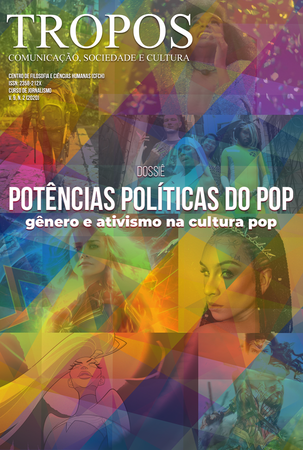APONTAMENTOS CONCEITUAIS SOBRE O ENSINO DE JORNALISMO NO CONTEXTO DAS NOVAS DIRETRIZES CURRICULARES E DA FORMAÇÃO SUPERIOR NA AMAZÔNIA
Palabras clave:
Ensino de Jornalismo; Currículo; Diretrizes Curriculares; AmazôniaResumen
O artigo apresenta os fundamentos conceituais que perpassam a estruturação do projeto pedagógico do Curso de Jornalismo da Universidade Federal do Amapá, destacando a compreensão teórica que subsidiou a reformulação do currículo, a partir das novas diretrizes curriculares para o ensino de jornalismo. Problematizamos os fundamentos e as dimensões que, em nosso entendimento, devem compor o currículo, considerando uma revisão crítica das diretrizes curriculares para a formação de jornalistas, dada a realidade e as demandas de formação na Amazônia. Para efeitos de conclusão, destacamos o papel do ensino, na articulação com a produção de conhecimento, que considere as especificidades, tensionamentos e contradições entre o campo profissional e de conhecimento do jornalismo, em uma dimensão epistêmica, que torna a prática pedagógica constitutiva de um processo de investigação que deve perpassar o currículo e subsidiar a prática pedagógica do pesquisador-jornalista-professor.
Citas
DEWEY, John. Arte como Experiência. Tradução Vera Ribeiro. 1ª edição (versão original de 1912). São Paulo: Martins Fontes, 2010.
_____. Experiência e natureza; Lógica, a teoria da investigação; A arte como experiência; Vida e educação; Teoria da vida moral. Traduções de Murilo Otávio Rodrigo Paes Lese, Anísio S. Teixeira, Leônidas Gontijo de Carvalho. Coleção Os pensadores. São Paulo: Abril Cultural, 1980.
FRANÇA, V.R. V. Paradigmas da comunicação: conhecer o quê. Ciberlegenda. Niterói, UFF, V5, 2001.
FREIRE, Paulo. Ação cultural para a liberdade e outros escritos. 8ª ed. Rio de Janeiro: Paz e Terra, 1982.
_____. FREIRE, Paulo (1970). Pedagogia do Oprimido. 47ª ed. Rio de Janeiro: Paz e terra, 2008.
MARTIN-BARBEIRO, Jesús. Dos Meios às mediações. Tradução de Ronald Polito e Sérgio Alcides. 5ª edição. Rio de Janeiro: Editora UFRJ, 2008.
_____. Tecnicidades, identidades e alteridades: mudanças e opacidades da comunicação no novo século. In: MORAES, Dênis de (org.) Sociedade Midiatizada. Rio de Janeiro: Mauad, 2006 p. 51-80.
MARTINO, L. C (org.). Teorias da Comunicação: muitas ou poucas? Cotia/SP: Ateliê Editorial, 2007.
MARTINO, L. C. História e Identidade: apontamentos epistemológicos sobre a fundação e fundamentação do campo comunicacional. E-Compós (Brasília), v. 1, p. 1-22, 2004.
_____. Cepticismo e inteligibilidade do Saber Comunicacional. Ciberlegenda, Niterói, UFF, V5, 2001.
MEDITSCH, Eduardo. Jornalismo como forma de conhecimento. Revista Brasileira de Ciências da Comunicação, Intercom. Vol. XXI, n° 1, jan/jun 1998, p. 25-38.
_____. O conhecimento do jornalismo. Florianópolis, SC: Ed. UFSC, 1992.
_____. Novas e velhas tendências: os dilemas do ensino de jornalismo na sociedade da informação. Rebej (Brasília), v. 1, p. 41-62, 2007.
_____. O pensamento de Paulo Freire sobre jornalismo e mídia. INTERCOM (São Paulo), São Paulo, v. XXVI, n.1, p. 25-46, 2003.
_____. Crescer para os lados ou crescer para cima: o dilema histórico do campo acadêmico do jornalismo. In: XXII Congresso Brasileiro de Ciências da Comunicação, 1999, Rio de Janeiro. Intercom 1999 CD-ROM. São Paulo/Rio: Intercom/JGF, 1999.
PAIVA, Raquel; SODRÉ, Muniz. Capital humano e sustentabilidade comunitária. Texto apresentado no GT Comunicación popular, comunitaria y ciudadania. ALAIC, Montevideo, 2012.
SILVA, Gislene. De que campo do jornalismo estamos falando? Matrizes (USP. Impresso), v. 1, p. 197-212, 2009 a.
_____. O fenômeno noticioso: objeto singular, natureza plural. Estudos em Jornalismo e Mídia (UFSC), v. 2, p. 9, 2009b.
SODRÉ, Muniz. Jornalismo como campo de pesquisa. Brazilian Journalism Research (Online), v. 6, p. 7-15, 2010.
SODRÉ, Muniz. Comunicação: um campo em apuros teóricos. Matrizes (USP. Impresso), v. 5, p. 11-27, 2012.
Descargas
Publicado
Cómo citar
Número
Sección
Licencia
Transferência de direitos autorais:
Declaro que após aprovado para publicação a Revista Tropos editada pela Universidade Federal do Acre (UFAC), passará a ter os direitos autorais do trabalho, que se tornarão propriedade exclusiva da Revista, sendo permitida a reprodução total ou parcial desde que devidamente referenciada.

